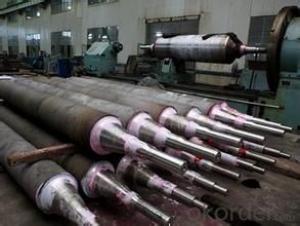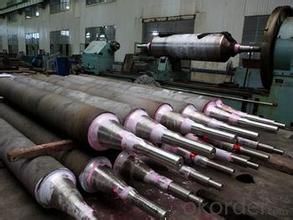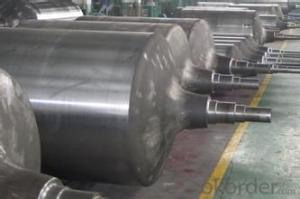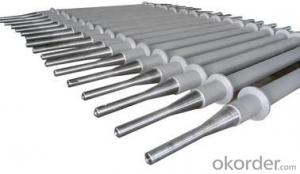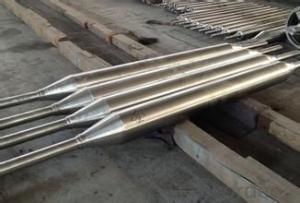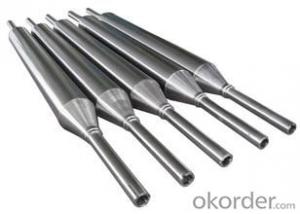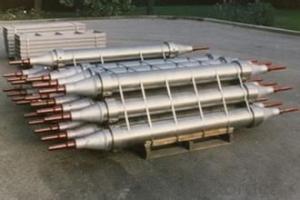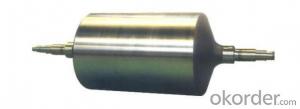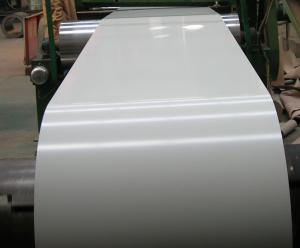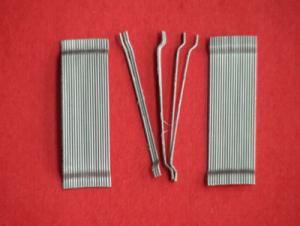Heat resistant furnace roll with high nickel and chromium.
- Loading Port:
- Tianjin
- Payment Terms:
- TT OR LC
- Min Order Qty:
- 1000 PCS
- Supply Capability:
- 10000 PCS/month
OKorder Service Pledge
OKorder Financial Service
You Might Also Like
Quick Details
| Condition: | New | Type: | furnace roll,heat resistant furnace roll | Usage: | Heat Treatment Furnace |
| Place of Origin: | Brand Name: | Model Number: | FR-013 | ||
| Certification: | ISO9001:2008 | After-sales Service Provided: | Overseas third-party support available,overseas service center available | Material: | high nickel and chrome alloy stainless steel |
| Process: | casting,machining | Feature: | long service life,consume saved | Size: | follow as drawings |
| Application: | metallurgical industry | Standard: | ANSI, ASTM, ASME, DIN, GB | Advantage: | strict tests and inspections |
| Inspection: | self-inspection or 3rd party inspection |
Packaging & Delivery
| Packaging Detail: | sea worthy packaging, wooden, steel cases packaging |
| Delivery Detail: | 25-45days |
Specifications
furnace roll are used in metallurgical industry furnaces
centrifugal/spun casted
made of high nickle and high chrome alloy
Heat resistant furnace roll with high nickel and chromium.
We offer custom engineering and production for assemblies and individual Components like machined tubes/barrel body,trunnions,shafts/journals,and refurbishment of existing rolls
Material:
High Nickel and high Chrome heat resistant alloys, Cobalt base alloys, like.
HU,HT,HK,HP,HW,24/24NbTiZr,50Cr/50Ni(2.4813),1.4865,1.4849,1.4848,1.4410,1.4059,1.4841, 1.4845,1.4852, 2.4879 or as per customer's requirements.
Application:
The various rolls/rollers are of good heat,corrosion,wear resistant properties,working at high temperature environment on average: 800-1200°C, which are used in the steel mills, like CAL(continuous annealing line),CGL(continuous galvanizing line).
Process:
Centrifugal casting for barrel/tube, forging for journal/shaft, static /investment or sand casting for cone/trunions, welding and machining and grinding.
Standard:
ANSI,ASTM,ASME,DIN,GB etc.
Quality control:
We have in-house facility for each inspection: Composition by Spectrometer; Size test,Mechanical test,NDT,UT,RT,PT,MT,ET,.
Certificates:
ISO9001:2008;3.1B Material Certificates,SGS Certificate.
Advantage:
(1). More than 30 years of professional experience and continuous R&D efforts enable us to offer better custom design and engineering advice.
(2). Use ONLY new raw material like Nickel plate, Chrome iron, Cobalt, Ferrotungsten to guarantee physical property and Increased service Life of our castings.
(3). International advanced-level equipment such as CNC, numerical lathes, furnance, welding equipment, CMM and detect &testing equipment we used to ensure our product's quality.
(4). Applied software for specification drawings: Pro/E, Auto CAD, Solidwork, CAXA, UG. etc.
(5). Focused sales and customer-service team are working with 100% passion to offer you a five-star purchase experience.
Quality control:
We carry out very strict quality control from raw material to each step of the process, until the finished product is dispatched. To make sure the highest quality possible, each test is carried out strictly with our in-house testing facilities. The most generally used methods of testing given below:
Chemical analysis by Spectrometer
Mechanical tests in Normal and High temperature.
Ultrasonic, X-ray, Dye Penetrant Test.
Boroscope; Eddy current testing; Microscope; Pressure tests.
In one word,we do everything to make your work easier!
- Q: How are steel products used in the construction of stadiums and arenas?
- Steel products are used extensively in the construction of stadiums and arenas due to their strength, durability, and versatility. They are used in the framework, roofing, and seating structures, providing the necessary support and stability for these large-scale structures. Steel beams, columns, and trusses are typically used to create the skeleton of the stadium, while steel roofing panels offer weather resistance. Additionally, steel is commonly used in the construction of seating systems, providing a secure and comfortable experience for spectators. Overall, steel products play a crucial role in ensuring the safety, longevity, and functionality of stadiums and arenas.
- Q: How do steel products contribute to the construction of theme parks and entertainment venues?
- Steel products play a crucial role in the construction of theme parks and entertainment venues. They provide structural support and stability to the various buildings, rides, and attractions. Steel beams and columns are used to create the framework for large structures like roller coasters, water slides, and observation towers. Steel decking is commonly used for flooring and walkways, ensuring durability and safety for visitors. Additionally, steel is often employed in the fabrication of themed decorative elements, such as sculptures and facades, adding aesthetic appeal to the overall design. Overall, steel products are essential in creating the strong, reliable, and visually appealing infrastructure that makes theme parks and entertainment venues possible.
- Q: How do steel products contribute to the recycling industry?
- Steel products contribute to the recycling industry in various ways. Firstly, steel is one of the most recycled materials globally, with a high recycling rate of around 90%. The recycling process of steel products helps conserve natural resources and reduces the need for mining raw materials, thereby minimizing the environmental impact. Secondly, recycling steel products saves energy as it requires less energy to recycle steel compared to producing it from scratch. Additionally, the steel recycling industry creates job opportunities and stimulates economic growth. Overall, steel products play a vital role in the recycling industry, promoting sustainability and resource efficiency.
- Q: What are the different types of steel wire and cables available?
- There are several types of steel wire and cables available, including galvanized steel wire, stainless steel wire, carbon steel wire, and alloy steel wire. Each type has its own unique properties and characteristics, making them suitable for various applications such as construction, automotive, electrical, and telecommunications.
- Q: How does steel pipe coating for natural gas pipelines work?
- Steel pipe coating for natural gas pipelines works by applying a protective layer on the surface of the pipe to prevent corrosion and ensure its longevity. This coating is usually made of fusion-bonded epoxy or other corrosion-resistant materials. The pipe is cleaned and preheated, and then the coating material is applied through a specialized process such as spraying or wrapping. Once the coating is applied, it is cured to form a strong bond with the pipe surface. This layer acts as a barrier against moisture, chemicals, and other elements, safeguarding the pipeline and maintaining the integrity of the natural gas transportation system.
- Q: How is steel sheet metal stamped for automotive parts?
- Steel sheet metal is stamped for automotive parts through a process called sheet metal stamping. This involves using specialized machines and tooling to cut, bend, and shape the steel into the desired automotive component. The process typically includes steps such as blanking, piercing, forming, and trimming to achieve the required shape and dimensions.
- Q: What are the applications of alloy steel in manufacturing?
- Alloy steel is widely used in manufacturing due to its exceptional properties. It is commonly used in applications that require high strength, resistance to corrosion, and heat resistance. Some specific applications include automotive parts, aircraft components, construction equipment, and machinery parts. Additionally, alloy steel is used in the production of tools, such as drills, cutting tools, and dies, as well as in the manufacturing of gears, shafts, and bearings.
- Q: How is steel used in the production of railway tracks?
- Steel is commonly used in the production of railway tracks due to its strength, durability, and ability to withstand heavy loads and harsh weather conditions. The steel rails provide a stable and smooth surface for trains to travel on, ensuring a safe and efficient transportation system.
- Q: How are steel products tested and certified for quality and performance?
- Steel products are tested and certified for quality and performance through a series of rigorous evaluation processes. The testing procedures include examining the mechanical properties, such as tensile strength and hardness, as well as conducting chemical analysis to ensure the correct composition of the steel. Additionally, destructive and non-destructive tests are conducted to assess the product's weldability, impact resistance, and dimensional accuracy. These tests are performed by qualified professionals and certified laboratories, following industry standards and specifications. Once the steel products pass all the required tests, they are granted certification to guarantee their quality and performance.
- Q: What are the different types of steel sheets and their uses in the automotive industry?
- There are various types of steel sheets used in the automotive industry, including hot-rolled, cold-rolled, galvanized, and advanced high-strength steel (AHSS) sheets. Hot-rolled steel sheets are commonly used for structural components due to their high strength and durability. Cold-rolled steel sheets, on the other hand, are preferred for body panels and other parts requiring excellent surface finish and dimensional accuracy. Galvanized steel sheets are coated with a layer of zinc, making them highly resistant to corrosion and ideal for automotive body panels. Lastly, AHSS sheets are specifically designed to provide superior strength while reducing weight, thereby enhancing fuel efficiency and safety in vehicles.
Send your message to us
Heat resistant furnace roll with high nickel and chromium.
- Loading Port:
- Tianjin
- Payment Terms:
- TT OR LC
- Min Order Qty:
- 1000 PCS
- Supply Capability:
- 10000 PCS/month
OKorder Service Pledge
OKorder Financial Service
Similar products
Hot products
Hot Searches
Related keywords
